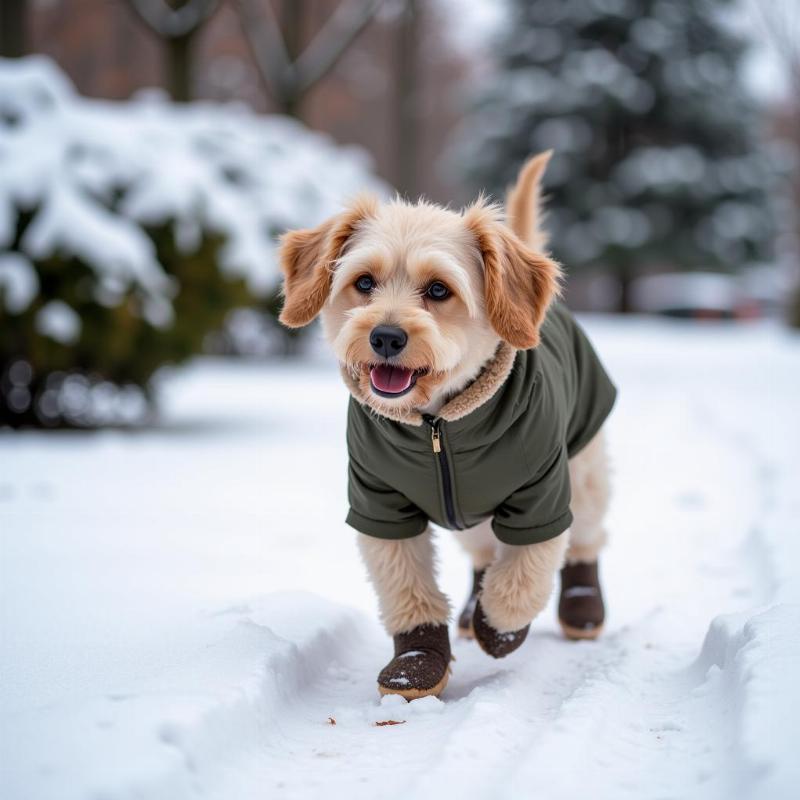Winter’s chill can make even the most enthusiastic dog walker hesitate. But how cold is too cold for dog walks? While our furry friends are often more resilient than we give them credit for, it’s crucial to understand the dangers of cold weather and how to protect your canine companion.
Recognizing the Risks of Cold Weather for Dogs
 A dog walking in the snow
A dog walking in the snow
Just like humans, dogs are susceptible to cold-related illnesses like hypothermia and frostbite. Factors like breed, size, age, and overall health play a significant role in how well they tolerate cold temperatures. Short-haired breeds like Chihuahuas and Greyhounds are particularly vulnerable, while breeds with thick double coats, such as Huskies and Malamutes, are better adapted to frigid conditions. Puppies and senior dogs are also more sensitive to extreme temperatures.
Determining a Safe Temperature Threshold
There’s no magic number for all dogs, but generally, temperatures below 32°F (0°C) pose a significant risk, especially for prolonged exposure. Watch for signs of discomfort like shivering, whining, lifting their paws frequently, or reluctance to walk. These are clear signals that it’s time to head back inside.
Factors Influencing Cold Tolerance in Dogs
Even above freezing, wind chill can significantly lower the “real feel” temperature, making it dangerous for dogs. Wet conditions exacerbate the effects of cold, so ensure your dog is dry before venturing out in chilly weather.
Protecting Your Dog in Cold Weather
Investing in appropriate winter gear can make a huge difference. A well-fitting dog coat provides an extra layer of insulation, while booties protect paws from ice, salt, and snow. Consider using paw balm to prevent cracking and dryness.
Tips for Winter Dog Walks
- Keep walks shorter in extreme cold. Several short walks are better than one long one.
- Choose well-lit and familiar routes to avoid icy patches or hidden dangers.
- Avoid walking near frozen bodies of water.
- Wipe your dog’s paws thoroughly after each walk to remove salt, ice, and snow.
- Provide plenty of fresh water to prevent dehydration.
Recognizing Signs of Hypothermia and Frostbite
Hypothermia symptoms include shivering, weakness, lethargy, and difficulty breathing. Frostbite typically affects the extremities like ears, tail, and paws, appearing pale, gray, or bluish. If you notice any of these signs, seek immediate veterinary care.
“Protecting your dog in winter isn’t just about keeping them warm, it’s about understanding their individual needs and taking proactive measures to ensure their safety and well-being,” says Dr. Amelia Shepherd, DVM, a renowned veterinarian specializing in canine care.
Conclusion
Knowing how cold is too cold for dog walks involves careful observation and understanding your dog’s individual needs. By following these guidelines and prioritizing your dog’s safety, you can ensure enjoyable and safe winter walks for both of you.
FAQ
- Do all dogs need winter coats? While some breeds are more tolerant of cold, a coat provides extra warmth and protection for most dogs in freezing temperatures.
- How can I tell if my dog’s paws are cold? If your dog is frequently lifting their paws, whining, or showing reluctance to walk, their paws are likely cold.
- What should I do if I suspect my dog has hypothermia? Seek immediate veterinary care.
- Is it safe to let my dog play in the snow? Supervised playtime in the snow can be fun, but monitor your dog for signs of discomfort and limit exposure in extreme cold.
- Are there any specific breeds that shouldn’t be walked in cold weather? Small, short-haired breeds, puppies, and senior dogs are particularly vulnerable to cold.
- What are the best types of booties for dogs in winter? Look for waterproof, non-slip booties that fit snugly but comfortably.
- Can I use human hand warmers on my dog? No, human hand warmers can burn your dog’s skin.
Beautdogs.us is your premier online resource for comprehensive dog care information, breed-specific advice, and top-quality product recommendations. Whether you’re a new dog owner or a seasoned pet parent, Beautdogs.us provides expert guidance to help you navigate every aspect of dog ownership. For personalized advice or inquiries, contact us at [email protected] or call us at +1 501-555-7529.